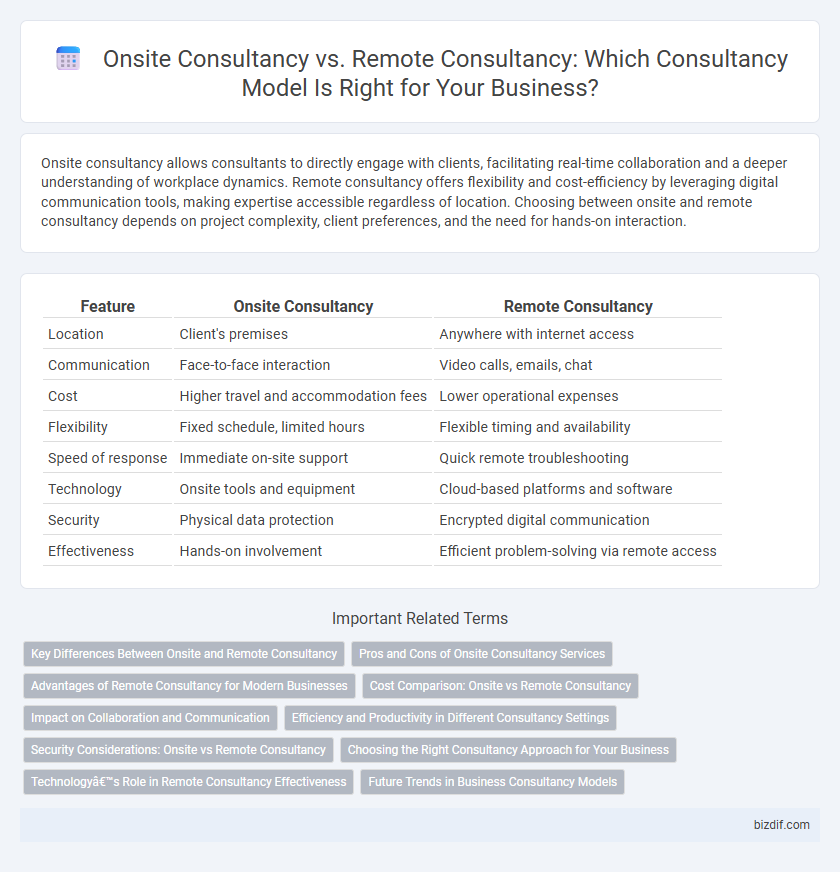Onsite consultancy allows consultants to directly engage with clients, facilitating real-time collaboration and a deeper understanding of workplace dynamics. Remote consultancy offers flexibility and cost-efficiency by leveraging digital communication tools, making expertise accessible regardless of location. Choosing between onsite and remote consultancy depends on project complexity, client preferences, and the need for hands-on interaction.
Table of Comparison
| Feature | Onsite Consultancy | Remote Consultancy |
|---|---|---|
| Location | Client's premises | Anywhere with internet access |
| Communication | Face-to-face interaction | Video calls, emails, chat |
| Cost | Higher travel and accommodation fees | Lower operational expenses |
| Flexibility | Fixed schedule, limited hours | Flexible timing and availability |
| Speed of response | Immediate on-site support | Quick remote troubleshooting |
| Technology | Onsite tools and equipment | Cloud-based platforms and software |
| Security | Physical data protection | Encrypted digital communication |
| Effectiveness | Hands-on involvement | Efficient problem-solving via remote access |
Key Differences Between Onsite and Remote Consultancy
Onsite consultancy requires consultants to work directly at the client's location, enabling real-time collaboration, immediate problem-solving, and direct access to physical resources. Remote consultancy relies on digital communication tools, offering flexibility, reduced travel costs, and access to a broader talent pool without geographical constraints. Key differences include communication immediacy, team integration, and the scope of direct interaction with client environments.
Pros and Cons of Onsite Consultancy Services
Onsite consultancy services provide direct, face-to-face interaction, facilitating immediate problem-solving and enhanced collaboration with your internal teams, which can lead to more tailored and effective solutions. However, onsite consultancy often involves higher costs due to travel, accommodation, and time investment, and it may limit flexibility compared to remote options. Organizations benefit from onsite consultancy when hands-on assistance, real-time communication, and deep integration with company culture are essential to project success.
Advantages of Remote Consultancy for Modern Businesses
Remote consultancy offers modern businesses increased flexibility by enabling access to specialized experts regardless of location, reducing travel expenses and time. It supports scalable and timely decision-making through digital tools and real-time communication platforms, enhancing productivity and responsiveness. This approach also facilitates a broader talent pool, allowing companies to leverage diverse expertise while maintaining business continuity during disruptions.
Cost Comparison: Onsite vs Remote Consultancy
Onsite consultancy often incurs higher costs due to travel, accommodation, and time expenses, whereas remote consultancy significantly reduces overhead by eliminating these charges. Remote consultancy leverages digital communication tools to maintain efficiency while lowering overall project expenses and expanding access to specialized experts globally. Cost analysis reveals organizations save up to 40% by opting for remote consultancy without compromising service quality.
Impact on Collaboration and Communication
Onsite consultancy enhances collaboration by enabling face-to-face interactions, immediate feedback, and real-time problem-solving, which strengthen team dynamics and trust. Remote consultancy relies heavily on digital communication tools, potentially causing delays and misinterpretations but offers flexibility and access to a broader talent pool. Effective collaboration in remote settings depends on robust communication platforms, clear protocols, and proactive engagement strategies.
Efficiency and Productivity in Different Consultancy Settings
Onsite consultancy fosters direct interaction and immediate feedback, enhancing collaboration efficiency and enabling real-time problem-solving. Remote consultancy leverages digital tools to maintain productivity through flexible scheduling and reduced travel time, although it may face challenges in spontaneous communication. Balancing onsite presence with remote support often maximizes overall consultancy effectiveness by combining hands-on engagement with technological convenience.
Security Considerations: Onsite vs Remote Consultancy
Onsite consultancy offers enhanced physical security by allowing direct oversight of sensitive operations and immediate response to potential breaches, reducing risks associated with data handling. Remote consultancy requires robust cybersecurity measures such as encrypted communications, multi-factor authentication, and secure VPN access to protect against cyber threats and unauthorized access. Ensuring compliance with industry-specific security standards like GDPR or HIPAA remains critical in both onsite and remote consultancy environments to safeguard confidential client information.
Choosing the Right Consultancy Approach for Your Business
Selecting the right consultancy approach depends on factors such as project complexity, communication needs, and budget constraints. Onsite consultancy offers direct interaction and hands-on support ideal for complex implementations, while remote consultancy provides flexibility and cost efficiency suitable for straightforward advisory services. Evaluating your business goals and team dynamics ensures optimal alignment with either onsite or remote consultancy models.
Technology’s Role in Remote Consultancy Effectiveness
Technology plays a critical role in enhancing the effectiveness of remote consultancy by enabling seamless communication through high-definition video conferencing, real-time collaboration tools, and secure cloud-based document sharing. Advanced technologies such as AI-driven analytics and virtual reality simulations help consultants deliver precise insights and immersive client experiences remotely. The integration of cybersecurity protocols ensures data protection, making remote consultancy a reliable and efficient alternative to traditional onsite services.
Future Trends in Business Consultancy Models
Future trends in business consultancy models emphasize a hybrid approach combining onsite consultancy's personalized, hands-on engagement with remote consultancy's flexibility and cost efficiency. Advances in digital collaboration tools and AI-driven analytics enable consultants to deliver real-time insights and strategic guidance regardless of location. Embracing these innovations, firms can optimize client interactions, improve scalability, and enhance responsiveness in dynamic market environments.
Onsite consultancy vs Remote consultancy Infographic

 bizdif.com
bizdif.com